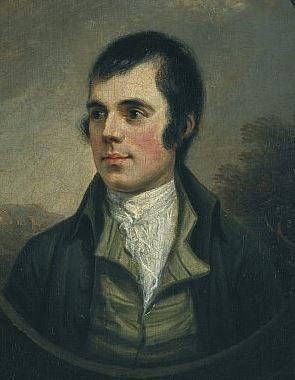 Robert BurnsAlexander Nasmyth [Public domain], via Wikimedia Commons
Robert BurnsAlexander Nasmyth [Public domain], via Wikimedia Commons
Robert Burns, or Rabbie as he was known, was the son of a farmer, born in Alloway, a village on the River Doon, Ayrshire, in the southwest of Scotland on January 25, 1759. Burns was a farmer and he remained one almost all his life, despite his success as a writer. The farmer's hard way of life taught Burns to take joy in fleeting pleasure and to be sceptical of the moral codes of the well-to-do. These attitudes, along with his capacity for love, friendship and hearty tavern fellowship, provide the chief themes of his poetry.
Burns had only a few years of formal education but he read many books by English and Scottish authors. In 1786, Burns decided to move to Jamaica because of setbacks in farming and an unhappy love affair with Jean Armour, a Scottish girl. His success in his first volume of poems made Burns go to Edinburgh where he became popular among fashionable society. In 1788, Robert Burns returned to farming. That year, he married Jean Armour and they had nine children. Burn's literary success helped him get a job as an excisemen (tax and customs official) in 1788. He got a steady income and in 1791, gave up farming and moved to Dumfries. He died there at the age of 37. The heavy farm labor in Burn's youth weakened his health and helped cause his early death.
Burns was interested in authentic folk songs. He collected about 300 original and traditional Scottish songs for books compiled in his day including "The Scots Musical Museum." He is famous for his poetry and his songs, some of which are: Auld Lang Syne; Comin’ Thro the Rye; Sweet Afton; Scots Wha Hae; Green Grow the Rashes; and A Red, Red, Rose which are all songs as well. In addition there is The Selkirk Grace – a grace before meals and Address to a Haggis, both of which are used at Burns Suppers – Burns Night celebrations held around the anniversary of his birth in Scottish communities worldwide. Burns wrote in both the Scots dialect and standard English. He wrote in English when he wanted to express customary or respectable ideas, as in 'A prayer in the Prospect of Death' and much of 'To a Mountain Daisy'. When Burns wished to express ideas that conflicted with custom or that dealth with less respectable aspects of human nature, he adopted the language of the uneducated Scottish peasant. Examples include 'The jolly Beggars' and 'Address to the Unco Guid'.
In his times, Burns was considered an unlearned ploughman, but he was really a skilled poet. He could use not only traditional Scottish stanza form, as in 'to a Mouse' but also the sophisticated English Spenserian Stanza as in 'The Cotter's Saturday Night'. Among his brilliant narrative poems was 'Tam o Shanter' and clever sattires including 'The Holy fair, Address to the Deil and Holy Willie's Prayer.
His song 'Auld Lang Syne' - which in scottish dialect means 'old long since, or days gone by. Burns had heard an old man sing the song and he wrote down the words and Burns has been given the credit for writing the song.
Auld Lang Syne
by Robert Burns (Scot Poet)
Should auld acquaintance be forgot,
And never brought to mind?
Should auld acquaintance be forgot,
And days o’ lang syne!
Chorus:
For auld lang syne, my dear
For auld lang syne,
We’ll tak a cup o’ kindness yet
For auld lang syne!
We twa hae run about the braes,
And pu’d the gowans fine,
But we’ve wander’d mony a weary foot
Sin’ auld lang syne.
We twa hae paidl’t in the burn
Frae morning sun till dine,
But seas between us braid hae roar’d
Sin’ auld lang syne.
And there’s a hand, my trusty fiere,
And gie’s a hand o’ thine,
And we’ll tak a right guid willie-waught
For auld lang syne!
And surely ye’ll be your pint’ stoup,
And surely I’ll be mine!
And we’ll tak a cup o’ kindness yet
For auld lang syne!
English Translation
Old Long Gone....
Should old acquaintances be forgotten,
And never brought to mind?
Should old acquaintances be forgotten,
And days of long ago !
Chorus:
For old long ago, my dear
For old long ago,
We will take a cup of kindness yet
For old long ago.
We two have run about the hillsides
And pulled the daisies fine,
But we have wandered many a weary foot
For old long ago.
We two have paddled (waded) in the stream
From noon until dinner time,
But seas between us broad have roared
Since old long ago.
And there is a hand, my trusty friend,
And give us a hand of yours,
And we will take a goodwill draught (of ale)
For old long ago!
And surely you will pay for your pint,
And surely I will pay for mine!
And we will take a cup of kindness yet
For old long ago!
Page created on 9/29/2005 2:58:32 PM
Last edited 1/19/2021 6:00:39 AM

No longer is this applicable because neither teacher nor student takes it seriously. Educational systems require reform. It also stresses the responsibility of knowledge where ‘knoweldge is power.’ Moral education has fallen into disrepute. Knowledge and knowledgeable people have to take responsibility to safeguard the morality in education. Education fuels economy and shapes society and is the key factor one should remember.
Three hundred years ago, Descartes said, “I think, therefore I am” but now technology changes minds and one can say, “I see, therefore I am”. However, I end with the logical thinking: “I keep myself aware and informed with technology and new sweeping waves of changes and therefore, 'I AM'” – Education without experience and exposure is incomplete, after all!